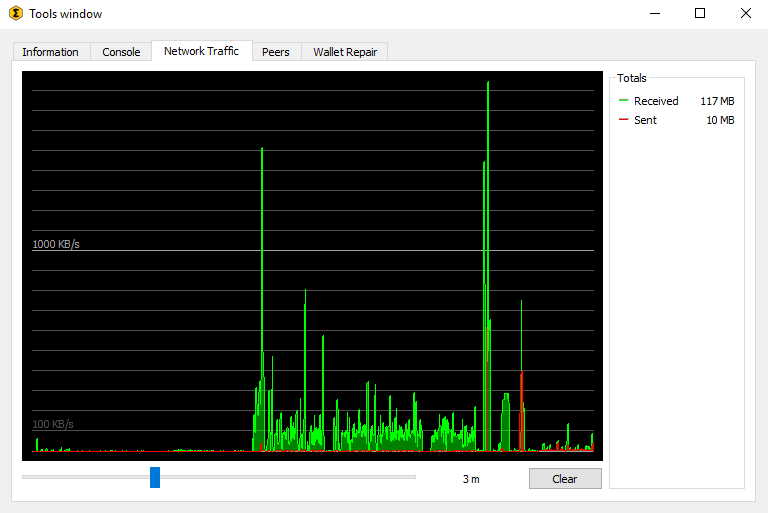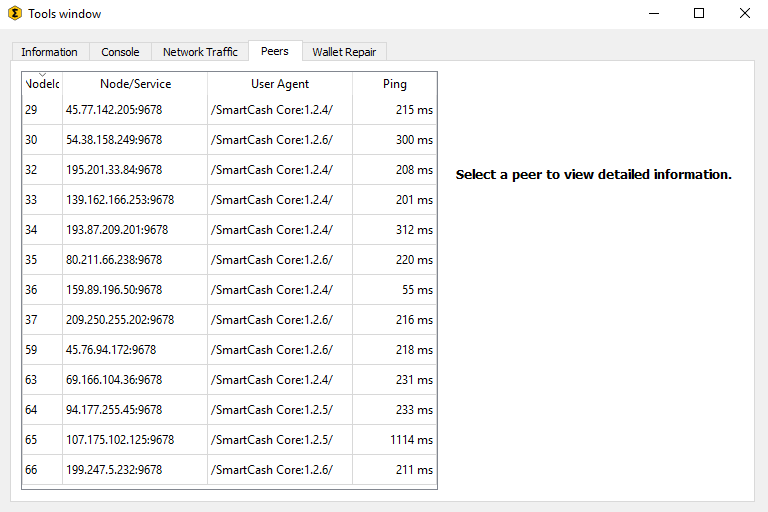Interface¶
The SmartCash NodeClient Wallet is an application that runs on your computer and allows you to make transactions on the SmartCash network. Most transactions are for sending or receiving SmartCash, but it is also possible to create signed messages or control a smartnode, for example. The SmartCash NodeClient Wallet interface is described in detail in the following sections.
The Main Window¶
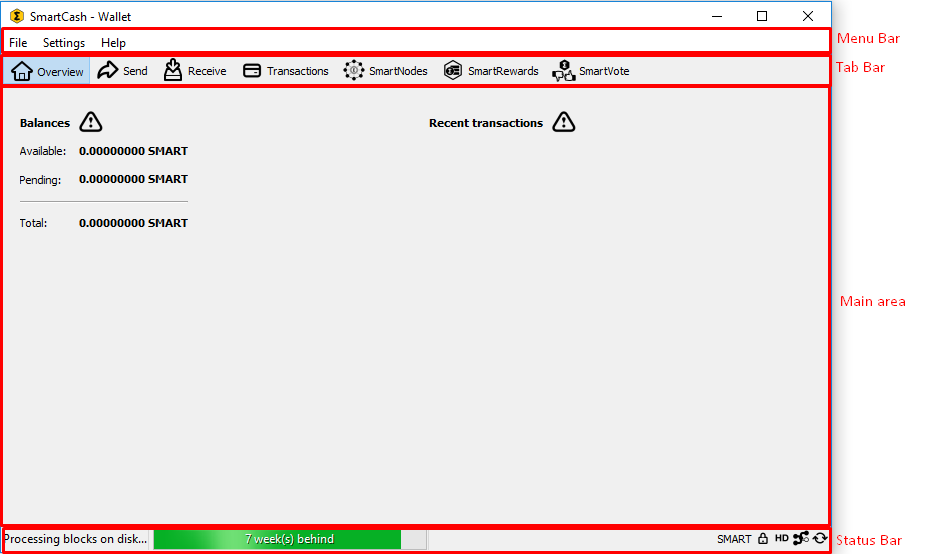
The SmartCash NodeClient Wallet
The SmartCash NodeClient window is broken up into several areas:
- The menu bar
- The tab bar
- The main area
- The status bar
The Tab Bar¶
The tab bar is used to quickly switch between the main areas of the SmartCash NodeClient. The content in the main area of SmartCash NodeClient changes depending on which tab you have selected. The following tabs are available:
The Overview tab¶
The overview tab offers quick access to your balance and most recent transactions.

The SmartCash NodeClient Overview tab
The left part of the main area is divided into two areas. The upper area shows your balances:
- Available
- This shows your current liquid balance. This is the amount of SmartCash you can spend now.
- Pending
- This shows funds waiting for a transaction to complete.
- Immature
- This shows funds from smartnode or mining payments which have not yet reached the required number of confirmations.
- Total
- This is simply your available and pending funds added together.
The right part of the screen shows your recent transactions. These are identified by icons as follows:
- Recent incoming transactions appear black, prefixed by a + sign
- Recent outgoing transactions appear red, prefixed by a – sign
- Incoming mining or smartnode payments also appear black
For more details on your transaction history, see the Transactions tab.
The Send Tab¶
The Send tab allows you to send funds to another address on the SmartCash network. It contains fields to enter the recipient’s address, a label for the address, and the amount of SmartCash you wish to send. Options related to the transaction fee, InstantPay are also available. A quick view of your total balance is also available in the lower right corner.
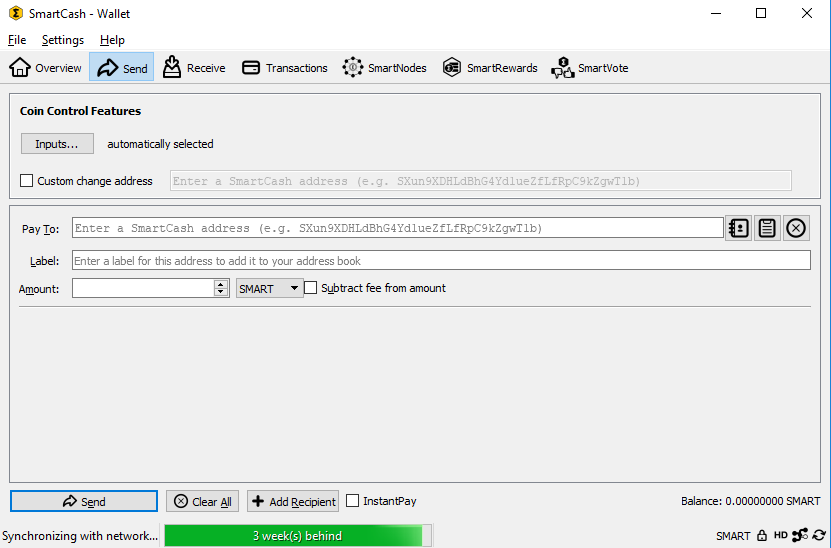
The Send tab
The Receive Tab¶
The Receive tab allows you to create addresses to receive SmartCash. You can create a request for a specific amount of SmartCash or include a specific message, and send it to another user as a link or QR code.
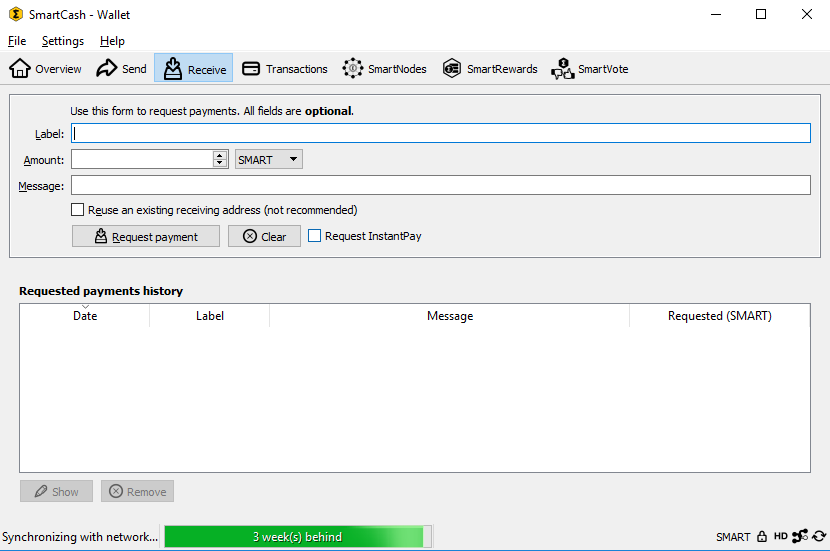
The Receive tab
The Transactions Tab¶
The transactions tab shows the entire transaction history for all addresses associated with your wallet. This appears as a table showing the time, type, label and amount of SmartCash for each transaction. You can also export the transaction history as a CSV file by clicking the Export button in the bottom right corner of the window.
The icons in the leftmost column indicate the status of the transaction. A tick indicates that the recommended number of confirmations has been passed, while a clock indicates that the transaction has yet to reach six confirmations.

The transactions tab
The Status Bar¶
The status bar shows a synchronization progress bar and a row of status icons which indicate the status of your connection to the SmartCash network.
The Synchronization Bar¶
This bar shows the synchronization status of SmartCash NodeClient with the SmartCash network. Each time you open SmartCash NodeClient, it will begin downloading the blocks which have been created on the blockchain in the time since you last opened the app. These blocks are downloaded from other SmartCash users and smartnodes. If you have never opened the app before, this could mean several years’ worth of blocks need downloading. The following statuses are possible:
- No block source available
- This occurs if your internet connection is down, or if the ports required by SmartCash NodeClient are blocked by a firewall.
- Synchronizing with network
- SmartCash NodeClient is downloading blocks from the network.
- Synchronizing smartnodes database smartrewards database
- SmartCash NodeClient is synchronizing other data with the second layer network.
Once synchronization is complete, the progress bar will disappear and a tick will appear on the right of the status bar.
The Status Icons¶

The lock icons indicate the status of your wallet: either locked or unlocked. You need to unlock your wallet to send funds or perform certain other actions.

These icons show the synchronization status of SmartCash NodeClient with the network. Once synchronization is complete, the refresh icon will become a blue tick.

These icons indicate whether your wallet is running in hierarchical deterministic (HD) mode or standard mode.
The Options Dialog¶
This documentation describes the functionality of the SmartCash NodeClient Options dialog, available under the Settings > Options menu in SmartCash NodeClient.
Main tab¶
The Main tab of the Options dialog contains settings related to startup and performance of the SmartCash NodeClient app.
- Start SmartCash NodeClient on system login
- This option causes SmartCash NodeClient to start automatically when the current user logs in. On most computers there is only one main user account which is logged in automatically when the computer turns on, so this option is effectively the same as starting SmartCash NodeClient together with the operating system.
- Size of database cache
- This option specifies the size of the database cache in memory. A higher value will result in increased performance when adding new blocks at the cost of higher memory usage. The default value is 300MB and it should not be set lower than this level.
- Number of script verification threads
- This option sets the number of script verification threads, ranging from -4 to 16. Script verification is the process of following instructions recorded in the blockchain to ensure the transactions are valid. 0 means automatic and will allow script verification to scale to the number of cores available on your processor. Setting a positive number specifies that SmartCash NodeClient should use that number of processor cores, while setting a negative number will leave that number of processor cores free.
Wallet tab¶
The Wallet tab of the Options dialog contains settings related to how addresses are managed in the SmartCash NodeClient app. This tab allows you to configure how these addresses are used as inputs with the Coin Control.
- Enable coin control features
- Your SmartCash NodeClient wallet balance is actually the sum total of all addresses holding balance that are associated with your wallet. When you spend SmartCash, SmartCash NodeClient will withdraw from as many inputs as necessary to make up the desired amount of SmartCash to be transferred. This behavior may be undesirable if you want to keep a certain balance on one address. The most common use case is the requirement to maintain 100000 SmartCash on a single address as collateral for a smartnode. Enabling this option will add a button labelled Inputs on the Send tab. This provides access to the Coin selection dialog, which can be used to lock, unlock and prioritize different addresses in your wallet. See here for a more detailed explanation of Coin Control.
- Spend unconfirmed change
- When this option is enabled, the SmartCash NodeClient wallet permits you to immediately spend change from previous transactions that has been transferred internally between addresses associated with the same wallet. This is possible even if the transaction has not yet been confirmed because the wallet knows it will eventually be confirmed since it created the internal transaction itself. Leaving this option enabled allows you to create new transactions even if previous transactions have not yet been confirmed.
Network tab¶
This tab includes options related to how your connection to the SmartCash network is made.
- Map port using UPnP
- This option causes SmartCash NodeClient to automatically attempt to open and map the client port on your router using UPnP (Universal Plug and Play). This feature is supported by most modern home routers and will allow you to connect to the SmartCash network without making any special settings on your router.
- Allow incoming connections
- This option causes your client to accept external connections. Since SmartCash is a peer-to-peer network and SmartCash NodeClient is considered a full client because it stores a copy of the blockchain on your device, enabling this option helps other clients synchronize the blockchain and network through your node.
- Connect through SOCKS5 proxy (default proxy)
- These options allow users on an intranet requiring a proxy to reach the broader internet to specify the address of their proxy server to relay requests to the internet. Contact your system administrator or check out the network settings in your web browser if you are unable to connect and suspect a proxy may be the source of the problem.
- Use separate SOCKS5 proxy to reach peers via Tor hidden services
- These options allow you to specify an additional proxy server designed to help you connect to peers on the Tor network. This is an advanced option for increased privacy and requires a Tor proxy on your network. For more information about Tor, see here.
Window tab¶
This option contains options governing behavior of the SmartCash NodeClient app window under Microsoft Windows.
- Hide tray icon
- When this option is enabled, SmartCash NodeClient will not display an icon in the system tray. This option cannot be selected at the same time as Minimize to the tray instead of the taskbar.
- Minimize to the tray instead of the taskbar
- When this option is enabled and the SmartCash NodeClient window is minimized, it will no longer appear in your taskbar as a running task. Instead, SmartCash Core will keep running in the background and can be re-opened from the SmartCash icon in the system tray (the area next to your system clock). This option cannot be selected at the same time as Hide tray icon.
- Minimize on close
- When this option is enabled, clicking the X button in the top right corner of the window will cause SmartCash NodeClient to minimize rather than close. To completely close the app, select File > Exit.
Display tab¶
This tab contains options relating to the appearance of the SmartCash NodeClient app window.
- User interface language
- Select your preferred language from this drop-down menu. Changing the language requires you to restart the SmartCash NodeClient app.
- Unit to show amounts in
- This allows you to change the default unit of currency in SmartCash NodeClient from SmartCash to mSmartCash, µSmartCash or duffs. Each unit shifts the decimal separator three places to the right. Duffs are the smallest unit into which SmartCash may be separated.
- Third party transaction URLs
- This option allows you to specify and external website to inspect a particular address or transaction on the blockchain. Several blockchain explorers are available for this. To use this feature, enter the URL of your favorite blockchain explorer, replacing the %s with the transaction ID. You will then be able to access this blockchain explorer directly from SmartCash NodeClient using the context menu of any given transaction.
The Tools Dialog¶
This documentation describes the functionality of the SmartCash NodeClient Tools dialog, available under the Help ==> Debug Window menu in SmartCash NodeClient.
Information tab¶
- General
- This section displays information on the name and version of the client and database, and the location of the current application data directory.
- Network
- This section displays information and statistics on the network to which you are connected.
- Block chain
- This section shows the current status of the blockchain.
- Memory pool
- This section shows the status of the memory pool, which contains transactions that could not yet be written to a block. This includes both transactions created since the last block and transactions which could not be entered in the last block because it was full.
- Open debug log file
- This button opens debug.log from the application data directory. This file contains output from SmartCash NodeClient which may help to diagnose errors.
Console tab¶
The Console tab provides an interface with the SmartCash NodeClient RPC (remote
procedure call) console. This is equivalent to the smartcash-cli command
on headless versions of SmartCash, such as smartcashd running on a smartnode.
Click the x icon to clear the console, and see the detailed
documentation on RPC commands to learn about the possible commands you can
issue.
Network Traffic tab¶
The Network Traffic tab shows a graph of traffic sent and received to peers on the network over time. You can adjust the time period using the slider or Clear the graph.
Peers tab¶
The Peers tab shows a list of other full nodes connected to your SmartCash Core client. The IP address, version and ping time are visible. Selecting a peer shows additional information on the data exchanged with that peer.
Wallet Repair tab¶
The Wallet Repair tab offers a range of startup commands to restore a wallet to a functional state. Selecting any of these commands will restart SmartCash NodeClient with the specified command-line option.
- Salvage wallet
- Salvage wallet assumes wallet.dat is corrupted and cannot be read. It makes a copy of wallet.dat to wallet.<date>.bak and scans it to attempt to recover any private keys. Check your debug.log file after running salvage wallet and look for lines beginning with “Salvage” for more information on operations completed.
- Rescan blockchain files
- Rescans the already downloaded blockchain for any transactions affecting accounts contained in the wallet. This may be necessary if you replace your wallet.dat file with a different wallet or a backup - the wallet logic will not know about these transactions, so a rescan is necessary to determine balances.
- Recover transactions
- The recover transactions commands can be used to remove unconfirmed transactions from the memory pool. Your wallet will restart and rescan the blockchain, recovering existing transactions and removing unconfirmed transactions. Transactions may become stuck in an unconfirmed state if there is a conflict in protocol versions on the network during PrivateSend mixing, for example, or if a transaction is sent with insufficient fees when blocks are full.
- Upgrade wallet format
- This command is available for very old wallets where an upgrade to the
wallet version is required in addition to an update to the wallet
software. You can view your current wallet version by running the
getwalletinfocommand in the console. - Rebuild index
- Discards the current blockchain and chainstate indexes (the database of unspent transaction outputs) and rebuilds it from existing block files. This can be useful to recover missing or stuck balances.







